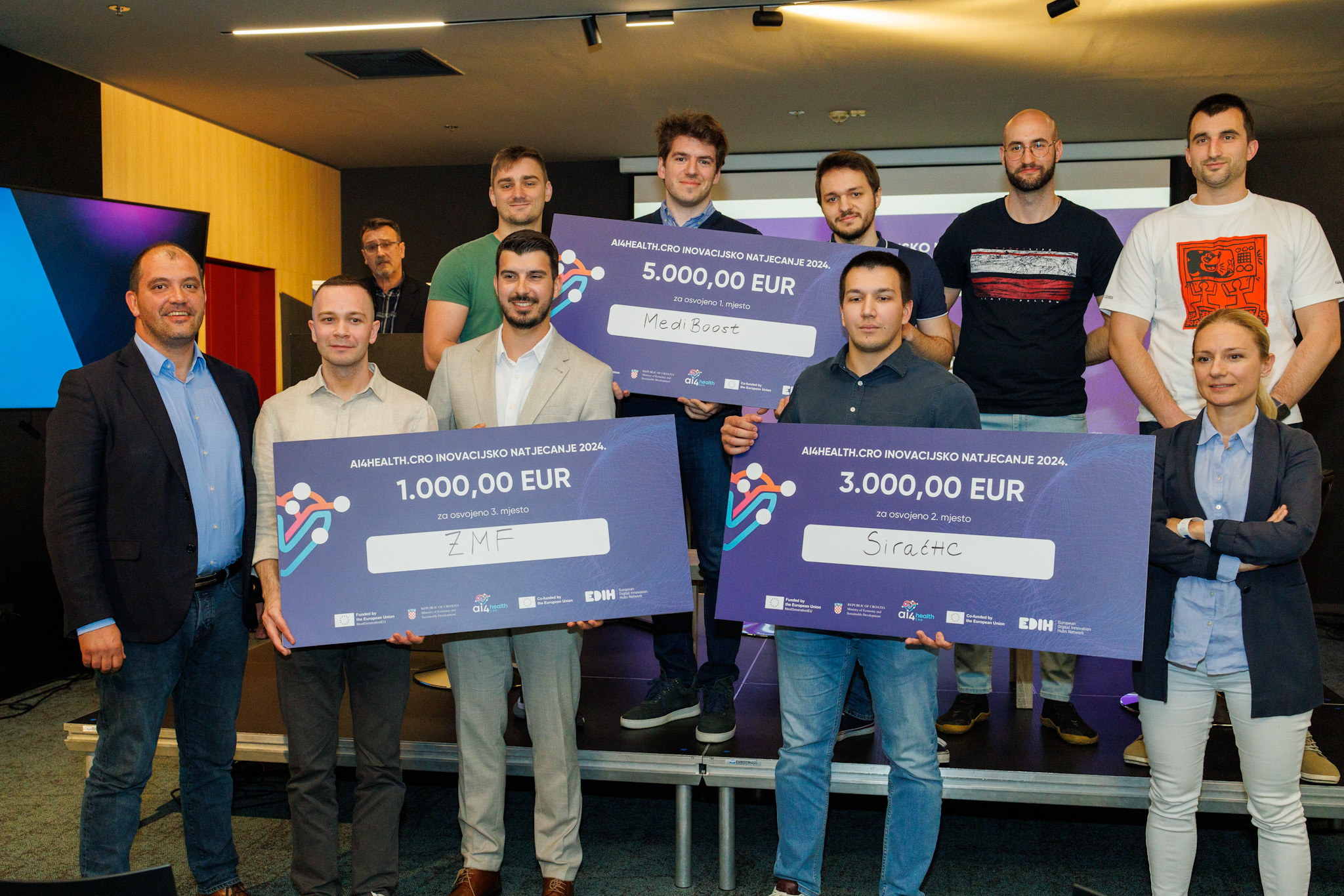At the AI4Health.Cro Annual Conference, the top three teams unveiled their AI-driven solutions to a gathering of 100 experts in AI, healthcare, and entrepreneurship.
These teams tackled the daunting challenge of using AI to predict the risk of hospital readmissions within 30 days post-discharge—a significant issue that annually costs over $25 billion in the US alone. Their tasks included developing predictive models, analyzing data qualitatively, and creating user interfaces that would allow healthcare professionals to understand and manage patient risks effectively.
Top Teams Recognized for Innovations
The awards were presented by members of the AI4Health.Cro expert team. The MediBoost team took first place and received prize of €5,000. The team consists of Jan Kolić, Karlo Pintarić and Andrija Štajduhar. Second place and €3,000 went to team SiraćHC, consisting of Lovro Trgovec-Greif, Martin Trgovec-Greif, Roko Šango, Iva Buljan and Filip Miočinović, while third place and €1,000 were awarded to team ZMF, consisting of Filip Đerke, Zoran Antolović and Milan Pavlović.
Dr Anja Barešić, the project coordinator from the Ruđer Bošković Institute, expressed satisfaction with the competition’s turnout and the quality of solutions, which combined AI applications with business models.
“Today, we witnessed pitches from some of our finest teams. I am optimistic that at least one startup will emerge from this talented pool, one that is dedicated to innovatively addressing a specific challenge in Croatian healthcare.”
AI4Health.Cro - Photo Gallery (19)
In a field of 28 teams, 10 of which made it to the final round, team MediBoost stood out by effectively combining their medical and computing backgrounds to develop a solution that addresses the significant financial and quality of life impact of early re-hospitalisations. The different skills and knowledge of the individual members enabled them to delegate tasks according to their strengths.
“Many thanks to Jan Kolić and Karlo Pintarić for the great teamwork, to all the other teams for their contributions and to the organisers for the challenging task that focused on the problem of predicting early hospital readmissions. The task included the creation of a predictive ML model, technical and medical interpretation as well as practical implementation and a business model,” explained Dr Andrija Štajduhar from the MediBoost team.
The team plans to further refine its predictive model, conduct additional tests and, most importantly, validate the model in a clinical setting. This collaboration aims to expand partnerships and formalise the business structure around their solution to pave the way for potential new healthcare startups.
Ongoing Commitment and Support from AI4Health.Cro
Dr Anja Barešić explained the complexity of judging such a challenging competition and highlighted the consortium’s top-class experts who have extensive experience and know-how in this field.
Frane Šesnić, Director of ZICER, expressed his satisfaction with the success of the competition: “The teams presented today show that with dedicated effort and the application of relevant knowledge, it is possible to achieve excellent results that improve the quality of life through improved patient care and bring economic benefits at the same time. This competition is also a valuable experience for our AI4Health.Cro consortium, as we have gained insights that will benefit us when organising future competitions.”
As the AI4Health.Cro Centre continues to attract start-ups through such innovation competitions and support numerous others who use its services, Dr Barešić concluded: “Our first year was very successful. To date, around fifteen start-ups have used AI4Health.Cro services and received individual programmes tailored to their specific needs, such as education, networking, access to funding or test-before-invest service. Thanks to a consortium of 16 different sectoral partners, the centre is well equipped to support these start-ups throughout their development from concept to commercial product.”
Congratulations to all participating teams for their outstanding efforts and innovations! The AI4Health.Cro team eagerly anticipates seeing how these projects develop and contribute to more efficient healthcare solutions for patients.



